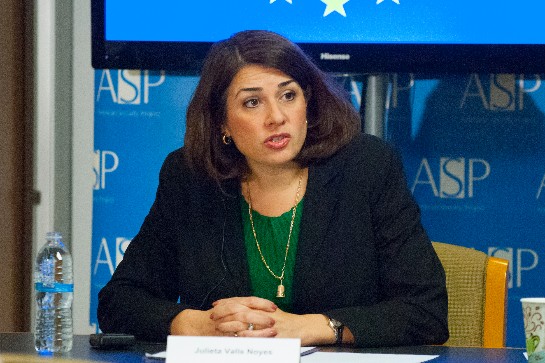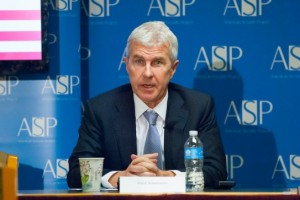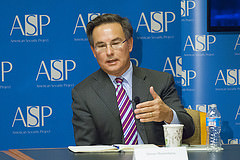 DAS Julieta Valls Noyes | American Security Project
DAS Julieta Valls Noyes | American Security Project
Partnering for Prosperity: The State of U.S.-EU Relations
Podcast: Play in new window | Download
Subscribe: Apple Podcasts | RSS
In the wake of Russian aggression, ISIL, climate change, Ebola, trade negotiations, elections in the European Union and the United States, and new leadership in the European Commission, U.S.-EU cooperation comes at a time when partnership is more important than ever.
ASP’s panel on The U.S.-EU Strategic Partnership featured a comprehensive and compelling discussion on the state of trade, energy and security between both entities. The speakers conversed regarding a variety of issues including the Transatlantic Trade and Investment Partnership (TTIP), relations between the U.S. and EU, and provided insight on how this key global partnership can be strengthened.
The discussion was spearheaded by the Deputy Assistant Secretary in the Bureau of Europe and Eurasian Affairs Julieta Valls Noyes, who began by emphasizing the importance of the U.S.-EU partnership. “Today we are carrying out words and policies rather than war. The U.S. and EU partnership is a peace project…the path to prosperity entails that we work together.” Owing to recent events, this new partnership is being tested. There is new leadership, a new parliament, and a newly-elected US Congress.
Paul Hamill, ASP’s Director of Strategy and Communications, and the panel’s moderator, asked the speakers how the U.S. and EU should face Russia during such an intense diplomatic situation. In the face of Russian aggression. Valls Noyes said that the U.S. and EU are working together to support Ukraine. They have jointly imposed successive rounds of sanctions on Russia. Paul Adamson, editor-in-chief and founding publisher of E! Sharp, like Valls Noyes, endorsed the sanctions, commenting that the U.S. and EU have done a “good job on sanctions” and have “forced everyone to work together.”
Both the U.S. and the EU recognize that “security is undergirded by prosperity,” highlighting the need to focus on energy security and trade. The TTIP, Ms. Valls Noyes said, “links the world’s two largest and most prosperous economies.” That the U.S. and EU are open for a resilient trade partnership like TTIP, underscores the depth of both entities’ commitment.
Adamson stated that TTIP is a modern, updated version of previous trade agreements between the U.S. and EU. There are broad economic and geopolitics, and market and trade aspects of the TTIP. It is a “docking station to which any country can attach itself…if it abides by TTIP parameters.” Europe wants a robust energy chapter in TTIP, as the agreement presents the opportunity for them to address their need for gas and energy supplies, which have been complicated due to Russian aggression.
However, the U.S., Adamson said, is not taking the EU seriously, but what’s worse, is that the Europe is not taking the European Union seriously. For this, Adamson proposed that the international order needs to be strengthened and modernized – a major potential for U.S.-EU cooperation. First, they need to “identify powerful areas of cooperation,” for which the TTIP is extremely important. Simon Rosenberg, President of NDN, noted that even though the party in power has been pushed out of Congress, anticipating collaboration on foreign policy issues is far easier, and increases the chances of getting TTIP approved in the U.S.
In mentioning President Obama’s speech at the UN, Rosenberg said that the President made it clear and explicit that strengthening the liberal international order is the cornerstone of his foreign policy, further inviting greater cooperation between the U.S. and EU. Adamson and Rosenberg concluded by stressing that TTIP should not be considered as just a ‘trade agreement,’ because it is much more than that.
Adamson further opined that the U.S. and EU need to modernize “our own economies… by successfully and wholly making a transition” towards the modern era. Europe is further behind in understanding the imminent changes to the world economy. As Valls Noyes stressed, prosperity is critical for the success of both European projects and U.S. democracy.







